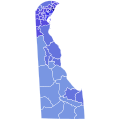| |||||||||||||||||
| Turnout | 62.9% | ||||||||||||||||
|---|---|---|---|---|---|---|---|---|---|---|---|---|---|---|---|---|---|
| |||||||||||||||||
Markell: 50–60% 60–70% 70–80% 80–90% >90% | |||||||||||||||||
| |||||||||||||||||
The 2012 Delaware gubernatorial election took place on November 6, 2012, to elect the governor of Delaware. Incumbent Democratic Governor Jack Markell won re-election to a second term, defeating Republican challenger Jeff Cragg in a landslide by a margin of over 40 points. As of 2025, this is the last time where a Democrat and a candidate from both major parties won all three of Delaware's counties in a gubernatorial election.



